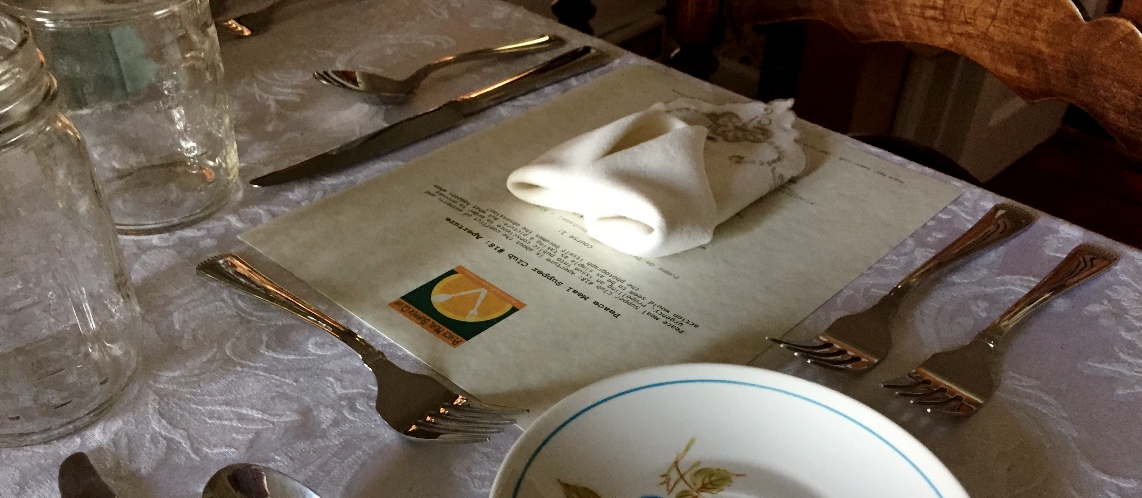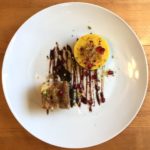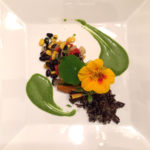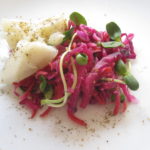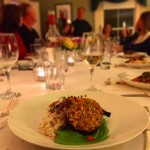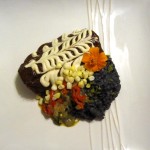
“Peace Meal Supper Club™ is a unique evening of fine food and progressive discussion, focused on strengthening ourselves as agents for positive change. I create a 4-course menu focused on a theme, such as Pollination, Fair Trade, Cacao, or even humble-but-life-giving Dirt. I share my research into the topic via in-depth essays on my website, which will hopefully inspire the conversation during the meal. It’s like a concept album which you can eat.”
Art is an expression of dissatisfaction with the state of one’s world. Or stated another way, an artist struggles within their dissatisfaction with the world around them. Like many other art forms, mine is meant to illuminate, challenge, and suggest.
I explore the dissatisfaction side of the equation through a multi-media inter-disciplinary examination of intersectionality: “the study of intersections between forms or systems of oppression, domination or discrimination,” applying it beyond studies of gender and race, to include undocumented agricultural workers, dirt, seeds, and the Mississippi River.
My diners and I have explored social movements, such as Labor, along with the subversive empowerment of Border Radio, and the celebration of freedom and self-improvement embodied in the African-American celebration of Juneteenth. Peace Meal Supper Club™ has provided a lens to explore post-Columbian-Exchange globalization, the status of Fair Trade cacao, and the humanitarian tragedy of successive and worsening refugee crises.
All of this with food as the primary medium. The taken-for-granted is often the most impactful.
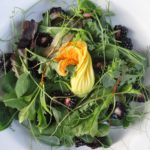
On the other side of the artistic equation is the hoped-for outcome. The goal is to re-imagine our world, to once again envision Utopia, and to offer Gratitude for all who helped us find it.
Oscar Wilde once wrote, “A map of the world that does not include Utopia is not worth even glancing at, for it leaves out the one country at which Humanity is always landing. And when Humanity lands there, it looks out, and, seeing a better country, sets sail. Progress is the realization of Utopias.”
We iteratively establish Utopias as stepping stones, mile markers to which we can refer when our course needs correction. With each new stone, we are more resilient and capable, winnowing ourselves into the core of what matters. As the powers-that-be successively nudge us closer to calamity, we revert to the soil and the sun and the simple. In this sense of recursion, Utopia–and Peace Meal Supper Club™–is Tao: returning to the simple sustaining forces that cannot be named, neither can they be dormant for long.
Recurring themes, regardless of any supper’s stated topic, have been several:
- Our significantly artificial food system
- Diminishing habitat and diversity, among animals, plants, and culture
- Reduction of keystone species and other signs of systemic collapse
- The overwhelm of industrial agriculture
- The overall struggle for fairness, reaching through civil rights, gender equality, and the rising awareness of animal rights
- Identity, dominion, imperialism, exploitation, extraction, displacement, and the silencing of dissent
The overlay is complex and intricate. Peace Meal Supper Club™, with its multi-sensory qualities, offers everyone an access point and therefore hope.
So how does one represent issues or concepts with food?
Sometimes it’s imitative: painting sound with sound, which so vexed Beethoven–or so I read a long time ago and possibly have inaccurately remembered. But it is simple. If you want your fourth movement to sound like a thunderstorm, then bring on the big sound. If you want your first course to resemble a big blossom, bring on the big filo.
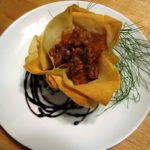
With this plate from the Pollination menu, Pumpkin Pot de Crème with Chocolate Balsamic Reduction, I am representing a native American squash blossom.
There is a tight specialized link between plants and their pollinators. This flower is far too big for a honeybee to efficiently pollinate. The squash bee, a much larger species, is perfectly proportioned. But as non-native plants arrived and replaced the native crops, so too did non-native pollinators—such as the European honeybee—replace native pollinators. Over time, the Europeans have come to dominate. The indigenous are losing habitat.

Sometimes the meal’s theme requires a more complex composition. The second course for the Pollination menu–Buckwheat Pilaf, Grilled Vegetables, and Lemon Rosehip Cream–portrayed the varied and seasonal work of pollinators, as well as the beauty at risk.
Buckwheat is one of the few grains that is pollinated by animals. Crops such as broccoli and carrots utilize pollinators to produce seeds. Squash need them in order to produce fruit. Roses to produce beauty. As people engage with this plate–its aromas, colors, textures, and bright flavors–they remember that they are part of the environment.
This plate is subtle but clear in its message: Pollinators need an annual progression of diverse crops in order to survive. In providing them with this—or not depriving them of it—we will be rewarded with a resilient food supply and a lush ecosystem. This is a vibrantly positive message. Though it seems to be a rational approach to agriculture, it stands in conflict with agribusiness-as-usual.
The false messages of industry are subtle as well. The commercial tomato—which has become so artificial as to no longer need soil, pollinators, or even human hands—convinces us that our abundance is secure, that we can sustain and indulge ourselves through the cleverness of our technology. We are expected to ignore the flavorlessness of the commercial tomato, as well as the social erosion that accompanies it.
The key ingredient in its production is fragmentation. Every component is disconnected from its native character and/or environment—not only the tomato, but the exploited worker, the soil’s nutrients, and the consumer. Considering the associated issues of human trafficking, border politics, and farmworker safety, it’s a perfect picture of intersectionality.

The dissenting view, however, arrives in this vibrant Double Tomato Tart, the second course for Peace Meal Supper Club™ #4: American Harvest. It brings a stimulating story of connection. The tomatoes on top were picked the day before I made the tart. They are resting on a sauce which I had prepared and preserved a month earlier, when my CSA presented me with a bonanza of heirloom tomatoes. Grown with regenerative practices—careful selection of seeds, stewardship of the soil, honoring of labor, and farmers who are in possession of their land—the tomatoes tell us how good things can be when everything is reconnected.
Disconnection among workers, soils, trade agreements, seeds, waterways—domestic and foreign—introduces instability into our food system. Our sovereignty becomes at risk, leaving us dependent and vulnerable, subject to exploitation.
It seems accepted that developing countries would experience food insecurity. However, this is not something we should ever consider normal. We should also not consider food insecurity to be a far-away problem.
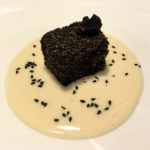
With Peace Meal Supper Club™ #18: Aperture, I explored the environmental collapse of the 1930s, including the degrading decades that led to the Depression and the Dust Bowl. The devastation of the American plains was not unlike the famine that struck Ireland in the mid-1800s, or the environmental tragedy unfolding in modern-day California. Food security is threatened on a global scale, driven by the political economic system utilized by the US and other developed nations. Our goods come through a massively unfair exchange with people and landscapes.
Waterways also need our attention, so with Peace Meal Supper Club™ #13: Mississippi I focused my lens on our uneasy relationship with the Mississippi River.
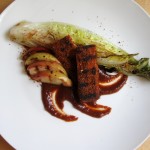
Though it once comprised one of the world’s largest wetlands, over the past three centuries the Mississippi watershed has been systematically dried, resulting in a prodigiously unstable river system and a rapidly eroding coastline. The first levees were installed in 1725, driven by French economic goals—a trend which we continue to the present day. Today, the system of levees and dams rivals in length the Great Wall of China. In forcing the river to flow according to our wishes, we invite each hurricane to be the worst yet.
As with the production of the commercial tomato, there are numerous political and social overlays: environmental degradation, racial marginalization, dispossession, and invasive economy.
While political economy fashions our dysfunctional relationship with the Big Muddy, our relationship to its dirt can be influenced by our own actions.
With the Dirt menu, each plate proclaimed the power of the soil and how we can contribute to its regeneration. Rather than consume foods produced in an extractive model—such as industrial wheat, sugar, soy, and corn—we can support farmers who are working in concert with their soil, choosing plants and methods which keep the underground thriving.

For example, in the second course for Dirt, I served a Roasted Beet Salad with Cover Crop Cocktail and Sesame Miso Dressing. The beets represented the goodness that the soil gives us, and also pointed to the underground nutrient exchange between microbes and plants. The cover crop cocktail–sprouted lentils, clover, and alfalfa–was comprised of plants that help pull nitrogen from the atmosphere into the soil. The dressing, with its fermented miso base, conjured the deep and mysterious alchemy of the underground. My message to the diner was simple: We can make regenerative agriculture profitable for farmers by supporting their growing of these crops. Doing so also bolsters our own food security and promotes greater social equality.
Dirt is linked to Seed is linked to Globalization is linked to Mississippi is linked to the Farmworker is linked to Social Justice. We do not live in a disconnected world, even though we see the symptoms in isolation.
The unspoken but very pronounced theme of Peace Meal Supper Club™ is this: We must not operate in single-issue mode. We cannot let ourselves be disconnected and dispossessed.
Professor Chien-hui Li, a fellow at the Oxford Centre for Animal Ethics, provides the wisdom borne of a broader view: “While there may be every need for the animal movement to focus on sharply-defined targets in order to achieve short-term goals, there is an equally urgent need to engage with wider literary, religious, scientific, political and other traditions, and to cultivate the state of mind of belonging to much broader social forces striving in the same directions of charity, equality, and justice. This could not only strengthen activists’ faith in something of a deeper nature and broaden their outlook, but also affect the spirit in which their work is undertaken and make it all the more powerful and appealing to others.”
This unified view of rights, fairness, compassion, and progress moves us one step closer to Utopia.
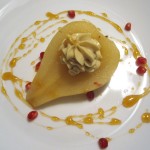
Peace Meal Supper Club™, like many artistic projects, posits an alternative worldview. It attempts to reset our mindfulness, in a comprehensive scope, towards our eating and therefore our existence. It asserts that Food Is Everything.
My hope is that my creative use of food will stimulate creative discussion regarding our rendezvous with progress. It is our responsibility and privilege–I should say it is the responsibility of our privilege–to make great changes in the way the world operates.
Reciprocity is never-ending. What we give to others, we receive for ourselves.
